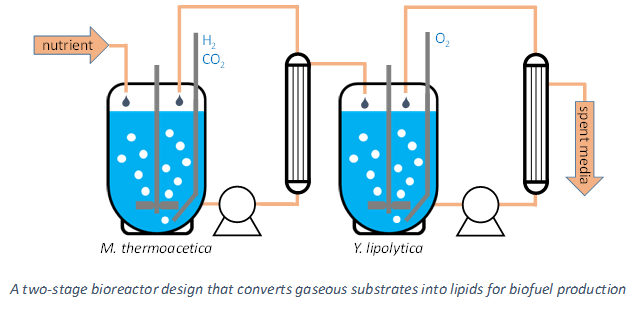Concerns over the depletion of readily available fossil fuels and their effects on environmental pollution and climate change have led to heightened interest in alternative sources of liquid fuels, such as biofuels. The first generation of biofuels utilized easily accessible sugars as feedstocks for the production of compounds such as ethanol and biodiesel. However, the sources of these sugars were generally food crops (e.g. corn, sugarcane), thus advanced biofuels are now being sought that do not compete with food production. Various alternative options are under investigation, including lignocellulosic biomass and photosynthetic microalgae, but commercial success has so far been limited. A promising alternative is synthesis gas (syngas) fermentation. Syngas fermentation by anaerobic acetogens is a novel method for the biological production of fuels and chemicals from gaseous substrates such as carbon monoxide (CO), carbon dioxide (CO2), and hydrogen (H2). These substrates are renewable, being produced via biomass gasification or natural gas reformation, thus the biological gas-to-liquids (GTL) process represents a sustainable platform that will be important for reducing dependence on fossil fuels.
Our lab is heavily involved in syngas fermentation research. We are developing new genetic engineering tools for Clostridium ljungdahlii, such as CRISPRi, to facilitate metabolic engineering in acetogens in order to access chemicals more valuable than ethanol. We have also examined mass-transfer limitations and optimal gas compositions for the acetogen Moorella thermoacetica. Based on these results, we have demonstrated a two-stage bioreactor system in which Moorella produces acetate, which is then fed to an aerobic yeast, Yarrowia lipolytica, which produces lipids that can be converted to biodiesel at very high yield. Further optimization of the Yarrowia bioreactor to maximize lipid production with a dilute acetate feed led to some of the highest lipid titers ever reported, hinting at the commercial viability of the fully optimized process.

Key Publications
Xu J, Liu N, Qiao K, Vogg S, Stephanopoulos G. 2017. Application of metabolic controls for the maximization of lipid production in semicontinuous fermentation. Proc. Natl. Acad. Sci. DOI: 10.1073/pnas.1703321114
Hu P, Chakraborty S, Kumar A, Woolston BM, Liu H, Emerson D, Stephanopoulos G. 2016. Integrated Bioprocess for Conversion of Gaseous Substrates to Liquids. Proc. Natl. Acad. Sci. 113:3773–3778.
Hu P, Rismani-Yazdi H, Stephanopoulos G. 2013. Anaerobic CO2 fixation by the acetogenic bacterium Moorella thermoacetica. AICHE Journal. 59(9):3176-3183